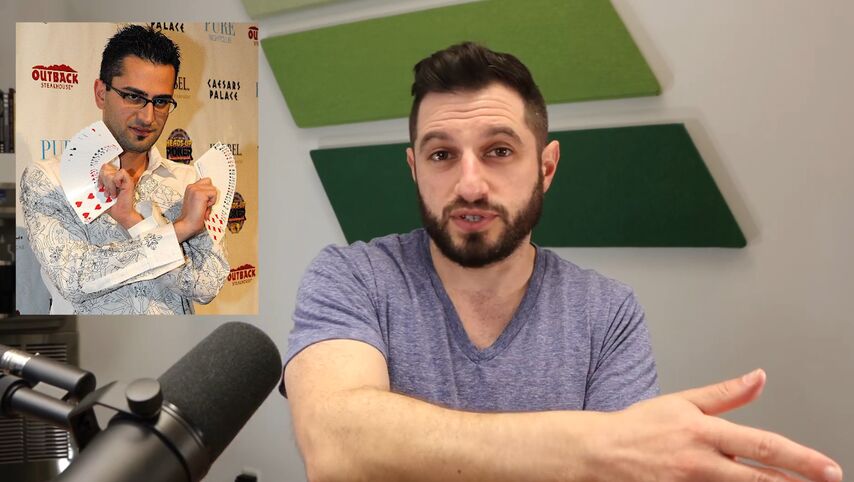Editor's Note: We continue to break down old videos of one of poker's most iconic players: Phil Galfond
I'll start with perhaps the most common misconception among those who don't know anything about poker: “Oh, you play poker? So you're counting cards?"
We count cards
Blackjack players are responsible for counting the dealt cards. They take into account the played cards from the shoe in order to approximately imagine which cards of which denomination are left more and which are fewer. A significant skew allows you to change the strategy – increase or decrease the rate.
In poker, one hand is played, after which the deck is reshuffled. Also, we do not see the cards of other players: only our own cards and common ones are visible. Therefore, it makes no sense for us to count cards. Poker is not a counting game, but a strategic one.
Personally, such questions do not annoy me, but I know that they really annoy many poker players. I think it's just funny. I decided to bring up this fallacy only because of its surprisingly widespread occurrence.
Out in the plus – time to leave
Suppose I won $50,000 in a year. When I talk about it, I get in response: “We must urgently finish before I lose everything back!” This is typical advice for gambling against casinos, which most often do not beat the distance in principle, or sports betting, in which most people do not have an advantage over the line. However, in poker, most people also do not beat the rake, but still, there are more plus professionals in poker than in betting. Therefore, the advice to leave while you are in the black is not entirely logical in poker.
In addition to professionals and semi-professionals who combine a profitable game of poker with work, there are people who gamble for fun. Some spend money on going to the movies, others on roulette or poker. I think if a person is able to control himself, no one should care about what kind of entertainment he spends his money on. He will decide when to finish. Another thing is ludo maniacs, pathologically addicted, so, of course, it’s better for them not to start at all.
Online it's all about luck
Many still believe that poker prowess is only revealed in a live game, where you can read the emotions of opponents, and believe that online, where this is not possible, success depends solely on luck.
I covered the topic of live and online in detail in one of the previous videos, so now I will be brief: this is very far from the truth.
I would say that the information available to us live and online differs by about ten percent, and this is a different ten percent. Both live and online provide us with additional data. Online, we have statistics that help determine the style of the players. In a live game, we can be able to understand people. Sometimes it is enough to exchange a few words with a player on the next box, and we already understand who we are dealing with.
The core of the game remains unchanged. We need to have a good, sound strategy, a good general understanding of poker, we need to know the basic math. We're not trying to guess which cards the dealer will open! Poker is not a lottery game, but a strategic one. Like chess, you can also play it online, but it's still chess.
Yes, poker is a game with incomplete, or rather, partially hidden information. Each player knows only his cards. Therefore, there is a theoretical opportunity to read the opponent by his behavior. But for most players, it remains theoretical. We greatly exaggerate our skills in this area, because we remember the hands when we were right and forget the mistakes. And even people who really know how to notice patterns in the behavior, facial expressions, gestures of opponents receive useful information quite rarely, in a small percentage of cases.
Playing online is also not completely devoid of psychology. Yes, there are reads online too. In the same way as when playing live, we can get additional information by analyzing the size of the opponent's bet (maybe there was a similar situation before, we remember his cards and the line chosen by him) and the speed of decision making. Live, we also see the movement of the hand sending chips to the pot, and the expression on the face, but I want to repeat once again: most likely, neither you nor your opponents will be able to draw something valuable from this. So don't be afraid to bluff in a live game. Even if your poker face isn't perfect, it won't matter. If you think bluffing is profitable, bluff.
It is not so difficult to notice that the opponent is nervous. However, for example, I always get nervous when the pot increases dramatically, both when I bluff and when I collect value. I think this is true for most players. You can read an emotion, but interpreting it correctly is another matter entirely. Only a few are capable of this.

All poker players are gamblers
When I started my way in poker, the attitude of the masses towards professional players was extremely negative. Everyone considered them complete gamblers, irresponsible and confused in life, who were just lucky to win a little longer than others. Attitudes have changed over the years, thanks in large part to online poker and my generation of pros.
Before there was online poker, people came to poker through gambling. Many of the professionals of those years were also rational and responsible people, but the proximity to the world of gambling left its mark on how they were perceived by the public. The ability to play online has made poker accessible to everyone, including people like me – I was in college and didn't gamble. Serious professionals came to poker from a very distant field from gambling, who played for fun and/or a small additional income. The talent and thoughtful approach to working on theory made many of them professional players.
Online poker has been in our lives for a long time, so the public opinion towards poker professionals is gradually changing. Today, more and more people understand what qualities are required to succeed in this game. And yet the delusion still exists and is widespread enough to be number four on my list.
Glamorous lifestyle
Yes, many people think that poker players live in a fairy tale. In principle, I can understand where this feeling comes from ...

Galfond's old apartment in Manhattan
I will add right away that if the lifestyle of representatives of any profession seems glamorous to you, you are probably mistaken: there is always more work and less fun than you think. And poker is also hard work. Many of those who want to become professionals fail and give up. And many of the accomplished professionals earn, let's say, fairly average money. They did not provide for themselves until the end of their lives.
In addition to the difficulties associated with improving one's own skills and the need to constantly gain large volumes of play, poker is very difficult psychologically, because it does not give any guarantees. It is difficult to come up with a job, for the qualitative performance which you will receive at the end of the month not a check, but a fine. In poker, this is quite possible. Some good players can play in the red for a whole year. It is better to compare the position of a poker player not with an employee, but with a business owner. It's like a one-man enterprise; you invest in your success, and then sometimes you win and sometimes you lose. And I know a lot of players who have done well but quit due to constant stress – they just weren't made for that lifestyle. (Some of them, however, returned after some time)
Basically, poker is like a business. There are obvious pluses: you choose your own working hours, choose the degree of risk that suits you, and do not report to anyone, and quality work is always rewarded (in the long run!) This is why I love poker. But there are also serious disadvantages, which are very exhausting and hit on the psyche.
Do I often turn to mathematics when I play games or work on theory? Not at all. However, most of the strong players that I know – not all, but most of them – are quite strong in mathematics. It seems that although we don't use math on a day-to-day basis while playing, math and poker are conceptually close in some ways.
Where does poker math begin? We learn how one hand stands against another – we learn equity. We learn the frequency with which draws are closed on one and two streets. To know all this, mathematical abilities are not required, the basic values can simply be remembered, there are very few of them. And by the way, many very strong players do well without exact knowledge.
I remember an incident many years ago when I played single-table tournaments seriously. In them, players often go all-in, you see percentages both during the game and when working on theory, so the ability to assess the equity of hands in all-ins is pumped very quickly. I once watched High Stakes Poker with Antonio Esfandiari. There was an all-in; someone asked him about his equity and Antonio said it was 60/40. He was wrong! Not too harsh, but strong enough to overwhelm me: how can such a good player not know this?!

In the future, I left SNGs for the cash game and soon began to notice that I sometimes make even worse mistakes in my estimates. It turns out that knowing the exact equity is not so important.
How useful is the ability to understand mathematical concepts in poker? The most valuable thing, perhaps, is the ability to quickly carry out very approximate calculations. But here, too, nothing extraordinary is required. If you ask me to calculate how much 7 * 14-5 will be, I will give an answer faster than 80% in a random sample, but not 95%, of course.
I would say that logic is more important, although logic is part of mathematics, at least in the university curriculum. I would estimate the share of logic and mathematics in the set of qualities necessary for a player at 40%. Another 30% will give a good understanding of oneself, the objectivity of self-esteem – these qualities are terribly underestimated. They are needed not only for choosing a game but also for determining your strengths and weaknesses in order to make a good curriculum or work on psychology. Approximately 20% of the remaining 30% is accounted for by psychology, which also includes empathy – understanding the thinking of other players. How to decompose the last 10% is a matter of taste, I don’t want to do it now.
So mathematics is quite important, but, firstly, its importance should not be overestimated, and, secondly, very average abilities are enough to master poker mathematics.
Among the top players, there are brilliant mathematicians who are pretty bad with objective self-esteem and psychology, but they somehow manage and feel good. But there are also very weak in mathematics, who gain at the expense of other strengths. Therefore, you should not give up on yourself if you do not succeed.
The topic raised by Galfond is crossed by a discussion on Remko Rinkema's Twitter:
Your new friends found out that you play poker, what will be their first reaction?
Daniela Andersen
“Did they show you on TV?” Because, as you know, appearing on TV shows is the only criterion for success!
Adam Schwartz
“My cousin/uncle/friend plays professionally, do you know each other?”
Nikolai Yakovenko
"Do you count cards?" and “What is your biggest win and loss?”
Sam Cosby
“Oh cool, my dad used to count cards too.”
Cliff Fisher
"Counting cards?"
Tammy Landau
“Wow, you never seemed so gambling to me.”
Jimmy Fricke
Almost everyone answers like this: “Oh, me too!”
Eric Haber
“Nice to meet you, Eric. How accurately do you think the ICM reflects the true value of a tournament stack?” They constantly ask, there is simply nowhere to go.














